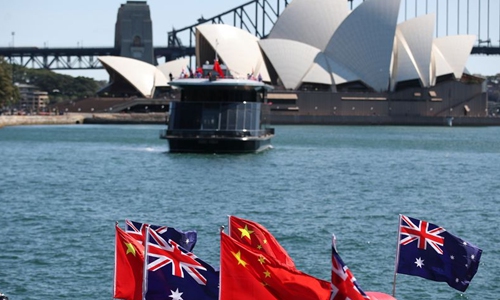China imposes punitive duties on Aussie barley, more products could be probed
By Chu Daye and Wang Bozun Source:Global Times Published: 2020/5/19 21:13:41
Australian seafood, dairy products may be ‘next in line’

File photo: Chinese and Australian national flags are seen at an event in Sydney, Australia, September 8, 2019. Photo:Xinhua
More Australian products, including seafood and dairy goods, could run into trouble in China after Beijing slapped an 80-percent tariff on Australian barley after a two-year antidumping and countervailing probe, Chinese experts said Tuesday.
Concerns are rising on probes of other Australia products, with a Bloomberg report Tuesday citing Chinese sources claiming that Australian wine, seafood, oatmeal, fruit and dairy products are in danger of being targeted by China.
The Ministry of Commerce (MOFCOM) Monday announced antidumping remedy measures against Australia's annual $1.5 billion barley exports to China, and there have been suggestions by some Australian officials about bringing the barley trade dispute to the WTO.
Yu Lei, a chief research fellow at the Research Center for Pacific Island Countries at Liaocheng University, said there might be more actions by China if the Australian government continues to harm China, describing the barley tariff as a "mild reminder."
"Trade should be independent from politics, but it's hard to completely divide them in reality," Yu told the Global Times on Tuesday.
Yu said China and Australia became strategic partners in 2013, and upgraded the relationship into a comprehensive strategic partnership in 2014, "but what Australia has done in recent years is not what a partner should do."
"China's move could also be interpreted as a mild warning to Australia that it should think about what a trade partner should do," Yu said.
Australian Agriculture Minister David Littleproud said on Monday that "there is no trade war" between China and Australia and there is rising demand for iron ore from China.
Chinese Foreign Ministry spokesperson Zhao Lijian said Tuesday that China's decision to impose anti-dumping and countervailing duties on Australian barley was based on investigations conducted in strict accordance with Chinese laws and WTO rules.
Australian government has been making political noises, demanding an independent inquiry into the COVID-19 outbreak in China, in its purposeful effort to smear and stigmatize China.
Li Guoxiang, a research fellow on agriculture at the Chinese Academy of Social Sciences, told the Global Times Tuesday that Australian dairy products and seafood are more vulnerable to investigation due to a supply glut in China.
According to Rural Bank of Australia, Australian seafood exports totaled $1.4 billion in 2017/18, and $658 million of that went to China.
Australia's Department of Agriculture said about 65 percent of Australian agricultural products are exported, with the majority going to China, Japan and the US. Beef, wine, wool and barley are among China's major imports from Australia.
Chinese experts told the Global Times that Australia could bring the matter to the world trade body. However, "it will take a minimum of two years for such a dispute to produce a result there," said Feng Jun, a senior consultant and WTO expert based in Shanghai.
Some Chinese grain merchants are on alert over the barley tariffs, which make Australian barley far less competitive in China.
Chinese barley importers may turn to France, Canada, Ukraine and Russia since Australian barley has lost its appeal, Ma Wenfeng, a senior analyst at Beijing Orient Agribusiness Consultancy, told the Global Times on Tuesday.
A manager at Shandong Province-based grain importer Huamao Fodder voiced concern to the Global Times after hearing about the anti-dumping and countervailing tariffs on Australian barley.
"I will have to turn to Ukraine or Canada to import barley instead of Australia, as the tariff rates are too high," he said.
Ties between Australia and China have deteriorated as the Australian government has taken unfriendly moves against China, setting barriers for Chinese investment and blocking Huawei's 5G from the market.
Yu said that although China is Australia's biggest agricultural products buyer, the sector only accounts for 15 percent of Australia's exports to China, suggesting more sectors could be affected if strained bilateral ties continue.
Australia's largest exports to China are minerals, with iron ore, coal and natural gas accounting for a combined $20.88 billion in 2019, according to Australia's Department of Foreign Affairs and Trade.
Some countries, including India, stand to benefit if China curbs imports of Australian minerals, experts said.
India's iron ore exports rose 154 percent to 30.82 million tons in fiscal year 2019, which ended on March 31, with China becoming the largest buyer for the South Asian country, industry news site csteelnews.com reported on Friday.
Newspaper headline: China imposes punitive duties on Aussie barley
Posted in: INDUSTRIES,BIZ FOCUS